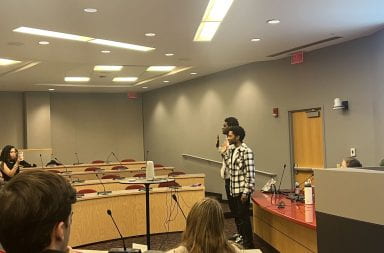Ohio could become the 38th state to ban texting while driving for all drivers, and the first state to prohibit 16- and 17-year-olds from using hand-held electronic devices while driving, after a text-ban bill cleared the Ohio Senate last Thursday.
The bill passed 25-8 in the Senate, with an even split of Democrats and Republicans voting against it. The bill must be approved by the House of Representatives before it is signed by Gov. John Kasich to be enacted. A spokesperson for Rep. Rex Damschroder, a Republican from Fremont who co-sponsored the bill, said it will likely be heard on the House floor May 15.
The House voted 88-10 to approve a version of the text-ban bill last June that did not include the ban of hand-held electronic devices for beginning drivers.
The updated version of the bill would make texting while driving a secondary offense for drivers 18 years old and older, meaning a driver caught texting must have been pulled over for violating another traffic violation that occurred first. Violators of the texting ban would pay a fine of up to $150.
For drivers younger than 18, texting while driving and the use of hand-held electronic devices for typing or talking, which include iPads, laptops and computer tablets, would be a primary offense. Those found in violation would face a $150 fine and 60-day license suspension the first time they are found in violation, and in subsequent violations would pay $300 with a year-long license suspension.
If enacted, the texting ban would have a six-month grace period where violators would be issued warnings rather than fines and license suspensions.
Sen. Jim Hughes, R-Columbus, voted for the bill but said he wishes there were fewer exceptions for when drivers could engage in text-based communication. The bill has 10 exceptions for adults and three exceptions for 16- and 17-year-olds, which include exemptions for the use of text-based communication in emergencies and for navigation.
“It’s a start in the right direction to save lives,” Hughes said.
Sen. Nina Turner, D-Cleveland, said that as the proposed bill would not prohibit all driving distractions, enforcing the bill would be difficult.
“If you’re over 18, you can still use an MP3 player, play Angry Birds, even check email while driving,” Turner said in an emailed statement. “There are so many exceptions that it would be a difficult law to effectively enforce. How can a police officer know whether someone is texting, dialing or using apps?”
Sen. Bill Coley, R-Middletown, said he could not support a bill that limits personal freedom.
“It would save lives at a cost of freedom. And that’s a price I’m not willing to pay,” Coley said. “Bottom line, the freedom to run your life should be respected. It’s an individual right to make your own decisions.”
Coley said roads would be safer if texting while driving was banned but said there isn’t a way to make driving completely safe.
“We could require every driver to wear a helmet like they do in NASCAR and then say, ‘You know what, that’s still not safe enough, so let’s make it a helmet with chin protection,'” Coley said. “There’s always going to be a way for even more extensive protection.”
Antonio Venegas, a second-year in international studies and sport and leisure studies, said he agrees with the anti-texting bill.
“You shouldn’t be using your phone while driving … Pull over, pull into a parking lot,” Venegas said. “I just don’t see the point of texting while driving and putting yourself in danger and putting others around you in danger.”
Other students agreed with the texting ban overall but had concerns about specific aspects of the ban.
Molly Martinez, a graduate student in psychology, said she agrees that beginning drivers should have additional restrictions but disagrees with the age distinction, as people begin driving at different ages.
“Age is arbitrary,” she said. “It should be the first two years on your license. You could be getting your license for the first time at 20. That doesn’t mean you’re a better driver.”
Sujay Mehta, a second-year in biology, said that while he thinks the anti-texting bill is fair, the potential for someone to pay two fines in an area with a local ban is not.
Local anti-texting laws for drivers that exist in cities like Columbus, Cincinnati, Toledo, Gahanna and Bexley would remain in place under the bill. A violator could receive a ticket for violating a local ordinance against texting and a second ticket for violating the possible state ban.
“We as a country don’t agree with double jeopardy, so why would this be OK?” Mehta said. “A state law should go over a county law.”
Mehta also said he has doubts of whether the texting ban would be effective in changing behavior.
“People are still going to do it,” he said. “They’re just going to hide it better.”


